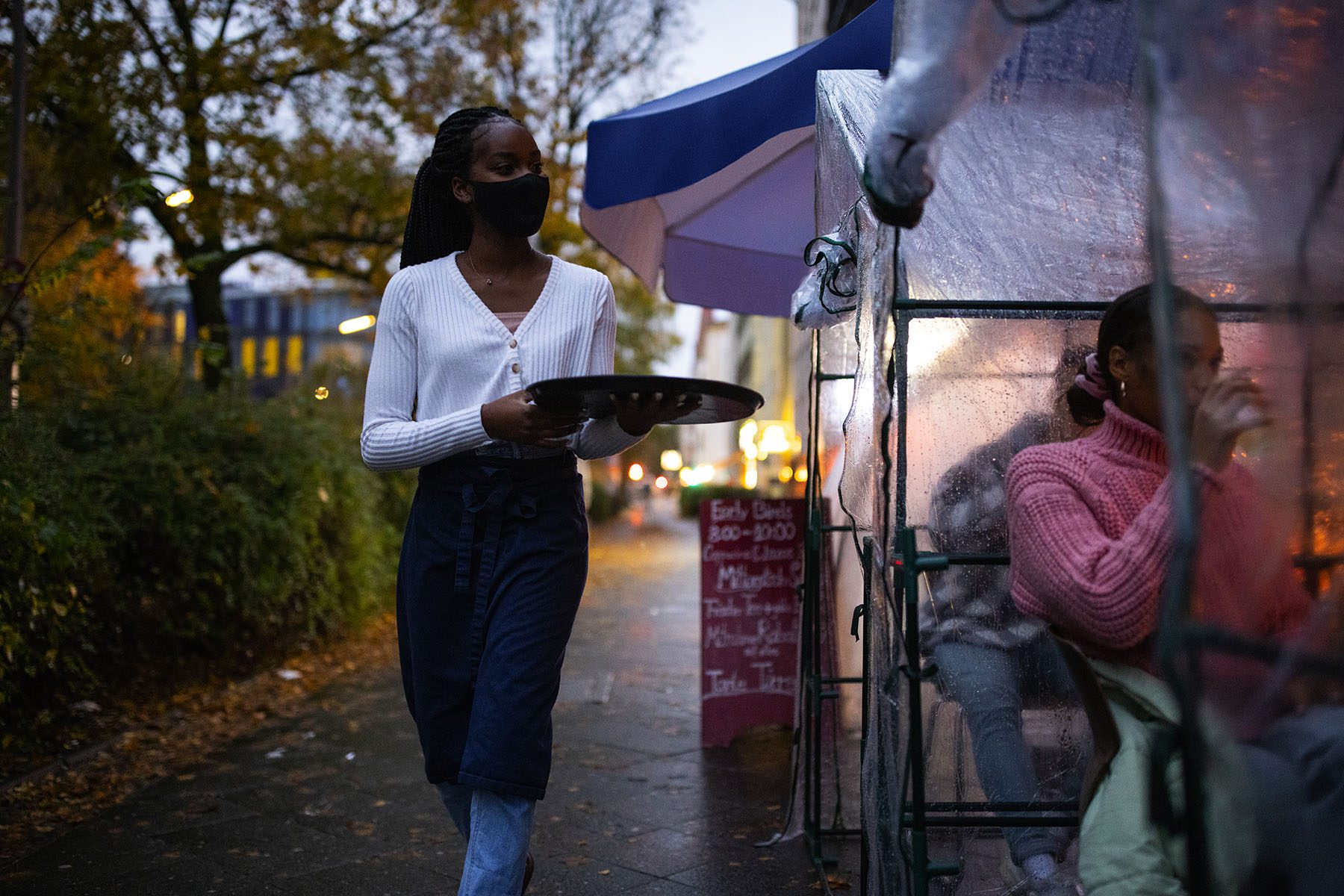The typical American retail worker or cashier is a young woman without a bachelor’s degree, and she’s more likely to be Black or Hispanic than other workers — so she’s more likely to face wage gaps and chronic economic loss. She’s paid low wages for a job with an unpredictable schedule, one that sometimes is set just days in advance and can change with little warning.
These unpredictable schedules and the financial hardships that they cause can upend childcare and school, said Kristen Harknett, an associate professor of sociology at University of California who has been studying the low-wage service sector since 2017.
“If you have this topsy-turvy life and schedule, it’s just easier to fall behind on a bill — you don’t notice your utility bill. If you don’t know exactly when you’re going to be working, it’s harder for you to have a second job,” said Harknett, who has directly surveyed workers on their experiences.
A new study shows that one policy change could make a difference: making employers guarantee what workers’ schedules will be at least two weeks in advance and compensate them for last-minute changes.
Through studying the effects of Seattle’s 2017 “secure scheduling ordinance,” Harknett and her colleagues found in a peer-reviewed study that hourly retail and food service workers who know their schedules at least 14 days in advance report more financial security, plus better sleep and overall well-being.
Those benefits would disproportionately help women, especially women of color, who are overrepresented in these industries and are often juggling caregiving roles that can make them vulnerable to dropping out of the labor force — and losing crucial income — without outside support.
Across restaurants in the United States, women are paid less than men in hourly jobs that already bring in low wages, according to 2014 data from the Economic Policy Institute. Poverty in the food service industry, which is already widespread, is highest for women and Black and Hispanic people, the institute found.
According to data collected by the SHIFT Project, which Harknett co-leads, women of color in retail and food service jobs have the most unstable schedules — which can put them at a higher risk of going hungry and not having regular housing.
In Seattle, those hardships were eased by having a steady schedule, according to Harknett’s study.
“It would be kind of a game changer if we saw these kinds of effects that we’re detecting in Seattle across the country,” said Alix Gould-Werth, director of family economic security policy at the Washington Center for Equitable Growth. The center gave Harknett’s team a seed grant when its research first began.
Laws like Seattle’s, commonly known as “fair workweek” laws, have been enacted mostly in cities — in Chicago, Philadelphia, New York City and San Francisco. Oregon was the first state to pass the legislation in 2017. That follows the same trend as other legislation aimed at improving job quality, like minimum wage hikes, which have passed across at least 29 states but failed to gain traction at the federal level.
“Employers can just do this — they don’t have to wait for a law,” said Susan Lambert, a professor at the University of Chicago’s Crown Family School of Social Work, Policy, and Practice.
Lambert interviewed managers tasked with implementing Seattle’s law in research undertaken separately from Harknett’s work, although their findings were presented jointly in the same report.
Understanding how managers and employers actually enforce scheduling laws like Seattle’s — and gauging their knowledge about it — is crucial, since the reality can be complicated and not everyone follows the rules.
Employers can just do this — they don’t have to wait for a law.
Businesses generally have two options when they comply with fair workweek laws, Lambert said: posting schedules in advance and not changing them, or scheduling however they want and paying workers for the changes.
“And those have very different ramifications for workers,” she said. “On the one hand, if your employer wants you to change and you agree to it, you get an extra hour of pay, a little more in your paycheck. But you don’t get schedule predictability.”
The waters can be easily muddied.
If an employer emails everyone on staff to ask if anyone can fill in for a coworker who’s called in sick, then the predictability pay requirement of Seattle’s law would not be triggered, Harknett said — because one person hasn’t been pressured to come in.
“That’s the kind of nuance in the Seattle law, where you could understand how sometimes workers or managers might not understand … and maybe they think they’re complying with the law, but they’re actually not,” she said.
Harknett and her colleagues found that 40 percent of workers covered by Seattle’s law still reported schedule changes with less than two weeks’ notice — two years after the law went into effect.
-
More from The 19th
- White House reveals nation’s first gender equity strategy, aiming to close the pay gap and increase abortion access
- Moms spent the equivalent of a full-time job on child care last year — while working at the same time
- Debt. Inaccessible accounts. Job sabotage. Domestic violence survivors often suffer economic abuse, too
Still, seeing Seattle workers report benefits from the city’s ordinance even without total compliance is still a good sign, Harknett said — and the pandemic has only underlined the urgency of what many service workers are going through.
“We still see that workers are facing these unpredictable, unstable schedules … even though there’s a lot of lip service to these workers as are our heroes,” she said. “We haven’t seen much change in the quality of their work conditions. And, in fact, they’re facing a lot greater risk.”
Although federal data is available to show the hardships faced by women working in restaurants and service jobs, there is far less research on what transgender and nonbinary workers in those industries face.
In Washington, D.C., a nonbinary barista who works at a local coffee chain told The 19th that having the kind of scheduling stability in Seattle’s law would improve their mental health and their sleep and help them get out of “survival mode” — spending most of their time thinking about work or planning to go to work.
“It would be super important to be able to look at my week, every week, and say, ‘OK, I know exactly when I’m needed at work,’ ” said the 23-year-old barista, who spoke on the condition that their name not be used to protect their job.
Their schedule has been especially inconsistent over the past three to four months, they said — which means things easily fall apart when someone calls out.
“It feels very much like, when the scheduling system isn’t consistent, like I am always needed there,” they said. “And if I do happen to call out, that it is a very bad thing.”
After working at the coffee chain since May, they still aren’t sure how the schedule is made. If they — and everyone else — could talk with management about having a consistent weekly schedule, then fewer people would be likely to call out and cause last-minute issues unless there’s a serious emergency, they said.
On top of handling a chronically short-staffed cafe, the stress of working during a pandemic, and trying to navigate an inconsistent schedule that’s made without their input, dealing with customers as a nonbinary person also adds another layer of stress, they said.
“Getting called ma’am, that takes a toll on me when it’s six hours a day, five days a week. It becomes exhausting.”
The latest Census shows that LGBTQ+ Americans often reported losing their jobs, not having enough to eat and being at higher risk of losing their housing compared with cisgender and straight Americans during the pandemic.
“We see lots of inequalities in working conditions for those who are gender nonconforming,” Harknett said, adding that work with her colleagues expected to be published next year will examine inequalities across more gender identities.
Despite the complexities of Seattle’s fair workweek law — and other laws like it — this new research shows that even if everyone doesn’t follow the rules, some of the most marginalized workers will still benefit, Gould-Werth said.
“I think in order to move this policy development process forward, it’s really important to have strong evidence,” she said. “So, here is some of our first strong evidence.”







